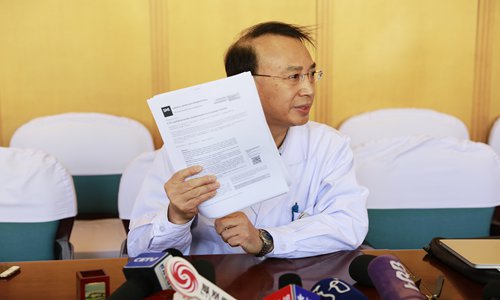
Professor Ren Xiaoping holds a press conference on Tuesday, explaining to the media that it is not accurate to call the surgery a "head transplant," and it was only an experiment. Photo: VCG
An Italian surgeon, who claims to have conducted the world's first head transplant on a corpse at a Chinese hospital, has dismissed ethical concerns saying he performed the operation in China because China was "the right place."
The sensational news announced at two press conferences, didn't stop many in China from calling it a "crazy idea."
In an interview with the Global Times, Italian neurosurgeon Sergio Canavero, who was ridiculed in the media after he held a news conference in Vienna, Austria to announce the "head transplant surgery," defended the operation saying "the controversial part of it is not controversial; it is that the West wanted it to be controversial."
His partner Ren Xiaoping, a surgeon at the 2nd Affiliated Hospital of Harbin Medical University and a professor at the Harbin Medical University, held another press conference in Harbin, Heilongjiang Province on Tuesday to respond to critics of surgery. "It is inappropriate to call it a head transplant because it was only an experiment," Ren told reporters.
Canavero provided Global Times with a document showing the surgery was approved by the Human Research Ethics Board at Harbin Medical University. "The patients (who donated their bodies for research; families signed a consent for such experimental work)," reads the document.
Experts cast doubt on the feasibility of head transplants as science has not proven it possible to reconnect the severed nerves in a spinal cord.
Canavero is unfazed by the ethical questions his experiment has raised. "I don't care," he told the Global Times in a telephone interview. "China must stop listening to what the Western media say. Because the West wants to stop China," said the Italian surgeon, who claims he's had correspondence with European and American surgeons saying that "they would like to do this (surgery)."
He showed a paper to the Global Times, which he co-authored with Ren. The document claims that "spinal cord fusion protocol has been validated by animals (mice, rats, dogs) experiment by three independent groups in South Korea, China and Germany … Journalists who witnessed some of these experiments called the results: near miraculous."
Canavero said the "paper" on his recent surgery is still being "proofed" and he will provide it when it is ready.
The Italian's partner, Ren, was quoted in Chinese news reports as making this understatement; "Controversies are normal when it comes to head transplants," Ren said. "I am a doctor, not an ethicist. I am just doing my job as a medical professional."
Canavero explained that he chose Harbin to do the surgery because "China is investing in science and technology in order to make this a Chinese century … China is doing something that people believe is impossible," said Canavero, adding the surgery followed "a very detailed, carefully planned design that we made two years ago."
Experts in China also raised ethical questions about the procedure.
"Even if the head transplant achieved some technical success it can not overcome the moral barriers," said Fan Mingsheng, a professor at the Shanghai University of Traditional Chinese Medicine, told the newspaper Wen Wei Po.
Fan said organ transplants aim to save lives, while head transplants cause "moral and ethical disorder."
The controversial procedure, perhaps conducted on multiple corpses, meanwhile raised concerns on China's social media platforms. Many posts challenge the two doctors with an ethical conundrum in the event that they are actually able to transplant the head of one person onto the body of another. "If the head of A is transplanted to the body of B, who will be the new person after the surgery? A or B?" asked some Weibo users.
Canavero maintains that ethical concerns are a contrivance of Western thinking. "Bioethics as such is not a scientific discipline. It springs forth from other forms of ethical debates that permeated Western history, in particular in Judeo-Christian religions," Canavero said.
Liu Changqiu, an academic who studies organ donations at the Shanghai Academy of Social Sciences' Institute of Law, told the Global Times that it is extremely difficult to surgically regenerate an injured spinal cord. "Without these surgeries nothing would be possible," he said.
Zhang Tiankan, a medical scholar, said people should keep an open mind. "The public should be tolerant of head transplants because it could lead to a medical breakthrough. Kidney and heart transplants were once controversial," said Zhang, noting there is a vast difference between organ transplants and putting one person's head on another's body.


